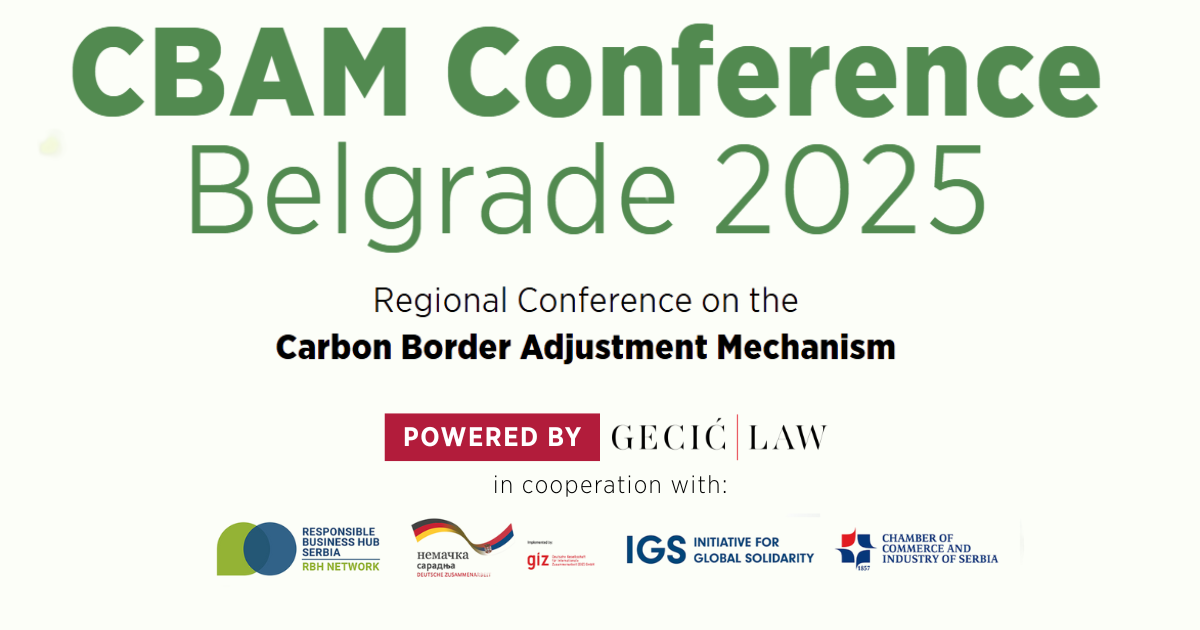

Powered by Gecić Law, in cooperation with the Responsible Business Hub of the Chamber of Commerce and Industry of Serbia, GIZ Serbia, and the Institute for Global Solidarity, the first Regional Conference on the Carbon Border Adjustment Mechanism (CBAM) was held in Belgrade. The event brought together key stakeholders from government institutions, the business community, international organizations, and experts to examine the implications of the EU CBAM regulation for the countries of the Western Balkans. The conference focused on the latest EU initiative to simplify the CBAM framework, the challenges and opportunities the mechanism presents for export-oriented economies in the region, and possibilities for regulatory alignment and cooperation at the regional and international levels.
In her opening remarks, the Minister of Domestic and Foreign Trade, Jagoda Lazarević, emphasized that, “Together, we must balance climate ambition and stability, ensuring economic fairness and regional prosperity. CBAM must not become a barrier separating Europe from the Western Balkans but rather a bridge facilitating Serbia’s successful green transition and deeper integration into the European family. Let us be partners on this European journey toward a carbon-neutral future—supported and encouraged,” said the Minister, adding that “A share of CBAM revenues should be allocated to Serbia and its regional neighbors to finance decarbonization, industrial modernization, and workforce reskilling. This would promote continued economic stabilization in the region.”, adding that “to this end, a share of CBAM revenues should be allocated to Serbia and its regional neighbors to finance decarbonization, industrial modernization, and workforce reskilling. This would promote continued economic stabilization in the region.”
Marko Čadež, President of the Chamber of Commerce and Industry of Serbia, highlighted the importance of joint action and knowledge exchange. “CBAM currently applies to companies in the sectors of steel, cement, fertilizers, aluminum, and electricity, but it may soon include the chemical and petrochemical industries, and over time, other sectors and their suppliers as well. That is why it is important that we use this conference as an opportunity for governments, economies, and experts to jointly define the best responses and strategies. CBAM is not just a cost and an obstacle, but also an opportunity for investment in the green transition, modernization of production, improvement of energy efficiency, and maintaining access to key markets. It is also a chance to strengthen regional cooperation and accelerate economic development within the framework of the new Growth Plan for the Western Balkans,” Čadež noted.
Bogdan Gecić, Founding Partner at Gecić Law, stressed that timely information and preparedness are vital for the business sector. “CBAM is not just the world’s first carbon-based tariff — it is a transformative policy tool that will reshape the very foundation of international trade. For the Western Balkans, its significance goes even deeper: it will fundamentally alter how we trade with the European Union, our most important economic partner. From now on, trade history will be distinguished as either before or after CBAM. The responsibility now lies with us to ensure that all stakeholders are equipped to navigate this shift and seize the opportunities it presents,” said Gecić.
Delphine Sallard, Senior Advisor at the European Commission’s CBAM team, explained in detail the recently proposed simplification of the CBAM Regulation under the Omnibus Package. “Proposed simplifications include a new CBAM de minimis threshold to exclude small EU importers with low emissions and reduce overall compliance cost, but ensuring that at least 99% of emissions remain in scope. The reform will also allow for the use of default carbon prices to facilitate the claim of a reduction for an effective carbon price paid in a third country and exclude the manufacturing processes of aluminum and steel downstream goods from the boundaries of the calculation of emissions,” Sallard stated. Proposed simplifications also include the removal of conditions on the use of default values for the calculation of embedded emissions and extended deadlines for submission of CBAM declaration and surrendering of certificates.
The thematic panels attracted particular attention, providing a comprehensive insight into the challenges and opportunities the EU CBAM presents for the region. The panels addressed key issues — ranging from the administrative and technical challenges faced by companies outside the EU to the impact of CBAM on sectors within its scope, as well as potential strategic and legislative responses of Western Balkan countries. Among the panelists were representatives of European institutions, the business sector, and legal experts, who emphasized the importance of regional coordination and the availability of technical support. For further information on the panels and panelists, please visit: CBAM Belgrade 2025 | powered by Gecić Law
The conclusion of the conference was clear: a unified and strategic approach by the region is essential to maintaining competitiveness and ensuring a successful transition toward sustainable business practices. The Western Balkans must act now. There is no time to lose.